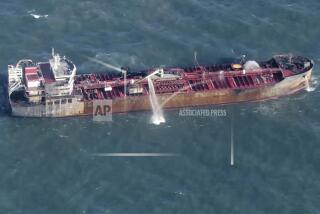Need to Prevent Oil Spills Is Stressed to State Panel : Environment: The initial public hearing into Huntington Beach tanker accident fails to shed significant new light on causes of the mishap.
- Share via
HUNTINGTON BEACH — The State Lands Commission chairman warned Wednesday that officials should focus on preventing future oil spills rather than celebrating the “near-heroic cleanup” of 394,000 gallons of crude that spewed last month from the wounded tanker American Trader.
Although he applauded British Petroleum for efforts to mop up the spilled cargo after it fouled miles of county beaches, State Controller Gray Davis urged officials to “look ahead” to prevent another spill that might be “two, three or even four times as large--and disastrous.”
“We can’t always assume that every spill will be as small,” said Davis, the State Lands Commission chairman, speaking at a hearing in Huntington Beach City Hall.
Davis and a fellow commission member, Lt. Gov. Leo McCarthy, renewed their call for a program to map and survey water depths around California’s 20 marine and offshore oil tanker terminals in reaction to the Feb. 7 American Trader accident.
The 811-foot tanker, owned by American Trading Transportation Corp. of New York, struck its port anchor and punched two holes in the forward storage compartment while trying to deliver 300,000 barrels of BP crude at a Golden West Refinery mooring about 1.3 miles southwest of Huntington Beach.
Ensuing investigations by the Coast Guard have focused on the accuracy of navigational charts. Preliminary results from a sounding being performed for the Coast Guard indicate that the charts are off by two to three feet, meaning that the water at the site may be too shallow for tankers the size of the American Trader.
Wednesday’s commission hearing, the first public inquiry into the spill, failed to shed significant new light on causes of the accident.
Several key figures in the Coast Guard’s investigation--including the tanker captain, Robert La Ware, and the mooring pilot, John Keon--did not appear on the advice of their attorneys.
Much of the testimony was a summary of efforts by skimming vessels and hundreds of workers to recapture the spilled oil from the ocean and along more than 10 miles of shoreline in Newport Beach and Huntington Beach.
Coast Guard Capt. James C. Card, the on-scene, cleanup coordinator, gave BP an “A-plus” for its skimming efforts, saying that just 20% of the spilled oil made it to the beach.
Card also credited a revised oil-spill response plan--completed by the Coast Guard just a day before the spill occurred--for helping officials react “quickly and effectively” to the crisis.
He said there is little doubt that the ship ran over its anchor: “The anchor fit into the hole in the hull like a jigsaw puzzle.”
Card said that federal officials last checked the depth of the offshore mooring in 1975, but that he is not sure when Golden West Refinery last surveyed the area. Golden West--along with American Trading and the National Oceanic and Atmospheric Administration--has taken new soundings around the mooring since the accident, but their results have not yet been made public.
At a press conference before the hearing, Davis and McCarthy said that government has failed to adequately regulate tanker traffic along the coast.
“This spill should serve as an alarm bell to wake up Americans that we are totally at the mercy of the oil industry,” Davis said. “If this was an airline, it would be grounded.”
Newport Beach and Huntington Beach officials said it was too soon to estimate the total damage from the spill. But Davis said the state is prepared “to sue” either BP or American Trading if those who suffered losses are not reimbursed.
Chuck Webster, a BP spokesman, said that American Trading has agreed to pay all cleanup and damage costs.
More to Read
Sign up for Essential California
The most important California stories and recommendations in your inbox every morning.
You may occasionally receive promotional content from the Los Angeles Times.












